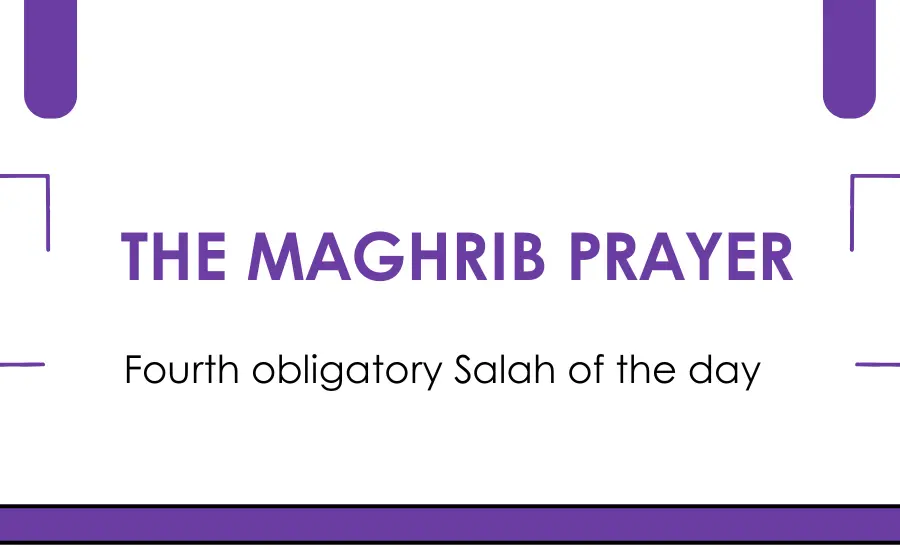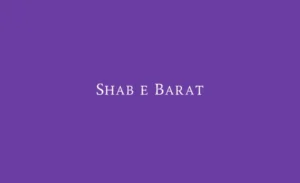The Maghrib prayer, the fourth Salah of the day, marks a sacred transition between daylight and night, between worldly effort and spiritual reflection. It is performed just after the sun sets, reminding every believer that as the day ends, gratitude and remembrance of Allah must begin.
Maghrib is not merely a ritual but a moment of divine connection, a time when hearts soften, angels record, and souls find peace in surrender. It is one of the most beautiful times for dua (supplication), as the Prophet Muhammad (peace be upon him) taught that the time around sunset is a moment when prayers are accepted.
This Salah carries profound meaning: it symbolizes the believer’s return to Allah after the day’s toil, the balance between dunya (worldly life) and akhirah (the Hereafter), and the beauty of ending one’s day in worship rather than distraction.
The Maghrib prayer is a call for reflection, forgiveness, and renewal, reminding us that just as the sun sets, every day in life is one step closer to meeting our Creator.
Meaning and Timing of Maghrib Salah
The word Maghrib literally means “sunset.” It is called so because this prayer is performed just after the sun has completely set and the red twilight still glows in the horizon. Here is a Quranic reference:
أَقِمِ الصَّلَاةَ لِدُلُوكِ الشَّمْسِ إِلَىٰ غَسَقِ اللَّيْلِ
Transliteration: Aqimis salata liduluki shamsi ila ghasaqil layl.
Translation: “Establish prayer at the decline of the sun until the darkness of the night.” – (Surah Al-Isra 17:78)
This ayah encompasses both Maghrib and Isha prayers, commanding believers to maintain their connection with Allah from sunset until nightfall.
Number of Rakats in Maghrib Prayer
The Maghrib prayer consists of 5 rakats in total, divided as follows:
- 3 Fard (Obligatory)
- 2 Sunnah (Recommended)
The 3 Fard rakats are mandatory and must be offered on time, while the 2 Sunnah rakats that follow carry great reward. You can also pray 2 Nafl rakats for more sawab. The Prophet Muhammad (PBUH) said:
“Pray as you have seen me praying.” – (Sahih Bukhari 631)
Hence, following the exact structure of the Maghrib Salah is an act of love and obedience to the Messenger of Allah.
The Virtues and Rewards of Maghrib Salah
The Maghrib prayer carries immense spiritual reward and divine favor, marking a time when Allah’s mercy descends and angels witness the believer’s devotion. It is a moment of forgiveness, gratitude, and inner peace after the day’s struggles. Performing Maghrib consistently strengthens faith, protects from evil, and brings light to the heart and home.
1. Immediate Connection with Allah after Sunset
Maghrib is the time when the angels of the day and night change shifts. It is a moment witnessed by both groups of angels, recording the worship and sincerity of the believer.
Hadith:
يَتَعَاقَبُونَ فِيكُمْ مَلَائِكَةٌ بِاللَّيْلِ وَمَلَائِكَةٌ بِالنَّهَارِ… وَيَجْتَمِعُونَ فِي صَلَاةِ الْفَجْرِ وَصَلَاةِ الْعَصْرِ
Transliteration: Yata’aqabuna fikum malaikatun billayli wa malaikatun bin-nahar… wa yajtam’una fi salat al-fajr wa salat al-asr.
Translation: “Angels take turns among you by night and by day, and they all assemble at the Fajr and Asr prayers.” – (Sahih Bukhari 555)
Although Maghrib is not mentioned directly here, its position at sunset carries the same significance, a spiritual change of angels marking a new record of deeds.
2. Protection from Shaytan and Evil
The time of Maghrib is one where the Prophet (PBUH) specifically warned against letting children or people wander unnecessarily, as it is a time when shayatin (devils) are active.
Hadith:
إِذَا كَانَ جُنْحُ اللَّيْلِ، أَوْ أَمْسَيْتُمْ، فَكُفُّوا صِبْيَانَكُمْ، فَإِنَّ الشَّيَاطِينَ تَنْتَشِرُ حِينَئِذٍ
Transliteration: Iza kana junh al-layl, aw amsaytum, fakuffu sibyanakum, fa inna shayatina tantashir hina’idhin.
Translation: “When the night approaches, or you are in the evening, keep your children inside, for the devils spread out at that time.” – (Sahih Bukhari 3280)
By praying Maghrib on time, a Muslim is shielded from evil influences and begins the night under Allah’s protection.
3. A Time of Acceptance of Dua (Supplication)
The time between Asr and Maghrib and the moments right after sunset are among the most blessed times to make dua. The Prophet (PBUH) said:
“Seek the hour (of acceptance) on Friday after Asr until sunset.” – (Sunan Abi Dawud 1048)
This indicates that Maghrib time, being close to sunset, is a moment of mercy when Allah answers the sincere prayers of His servants.
4. A Symbol of Gratitude and Renewal
Maghrib marks the closure of one’s daily efforts. It is a time for reflection, gratitude, and renewal of faith before the darkness of night.
Hadith:
“The most beloved deeds to Allah are those performed regularly, even if they are small.” – (Sahih Bukhari 6464)
Performing Maghrib consistently ensures that a believer ends each day with remembrance, submission, and peace.
Congregational Maghrib Prayer (Salat al-Jama’ah)
Praying Maghrib in congregation (Jama’ah) carries immense reward and spiritual significance. The Prophet Muhammad (peace be upon him) emphasized the superiority of praying in congregation over praying alone, as it strengthens unity, increases blessings, and multiplies rewards.
Hadith on Congregational Prayer
صَلاَةُ الْجَمَاعَةِ تَفْضُلُ صَلاَةَ الْفَذِّ بِسَبْعٍ وَعِشْرِينَ دَرَجَةً
Transliteration: Salat al-jama’ah tafdulu salat al-fadh bi sab’in wa ishreena darajah.
Translation: “The prayer in congregation is twenty-seven times more rewarding than the prayer offered alone.” – (Sahih Bukhari 645)
This applies to all five daily prayers, including Maghrib, showing the immense value of joining the community in worship.
Spiritual and Social Benefits of Congregational Maghrib Salah
- Strengthens Brotherhood and Unity: Gathering in the masjid at sunset connects hearts and reinforces the bond of ummah (community). It reminds believers that Islam is not an individual faith but a collective journey toward Allah.
- Brings Barakah (Blessings) in the Evening: Praying Maghrib together fills the home and community with tranquility and light, especially as night begins. The angels surround those who remember Allah together, and Allah’s mercy descends upon them.
- Encourages Punctuality and Discipline: Attending Maghrib in Jama’ah teaches time management and devotion. Since the Maghrib time is short, it motivates believers to prioritize Salah immediately after sunset.
- Protection and Peace for the Night Ahead: A person who ends their day in the masjid with the congregation starts their night under Allah’s protection, free from anxiety and spiritual restlessness.
Prophet’s Practice (Sunnah of Maghrib Jama’ah)
The Prophet Muhammad (PBUH) never delayed the Maghrib prayer, and he would lead it as soon as the sun had set, emphasizing its punctuality. He encouraged companions to pray in congregation and remain in the masjid for dhikr afterward.
Hadith: “When you hear the call to prayer, respond to it.” – (Sahih Muslim 849)
Answering the Adhan and joining the Maghrib Jama’ah is a sign of love, obedience, and humility before Allah.
For Those Unable to Attend the Masjid
If one cannot join the congregation due to work, travel, or valid reasons, praying with family at home is also highly rewarding. A husband leading his family or friends in Maghrib Salah brings collective blessings and encourages spiritual growth within the household.
The Prophet (PBUH) said: “When there are three men in a village or desert and they do not make the call to prayer and establish the congregation, Satan takes control of them. So stick to the congregation, for the wolf eats only the stray sheep.” – (Abu Dawud 547)
This hadith shows that staying connected to the congregation, whether in the masjid or at home, guards the believer from negligence and spiritual weakness.
Combining Maghrib and Isha in Certain Situations
Islam provides flexibility for the believer when facing genuine hardship, travel, or urgent situations. The Prophet Muhammad (PBUH) combined Maghrib and Isha prayers at times without fear or rain.
Hadith:
صَلَّى رَسُولُ اللَّهِ صَلَّى اللَّهُ عَلَيْهِ وَسَلَّمَ الظُّهْرَ وَالْعَصْرَ جَمِيعًا، وَالْمَغْرِبَ وَالْعِشَاءَ جَمِيعًا فِي غَيْرِ خَوْفٍ وَلَا مَطَرٍ
Transliteration: Salla Rasulullah sallallahu alayhi wa sallam az-zuhr wal-asr jami’an, wal-maghrib wal-isha jami’an fi ghayri khawfin wala matar.
Translation: “The Messenger of Allah (PBUH) combined the Zuhr and Asr prayers, and the Maghrib and Isha prayers without fear or rain.” – (Sahih Muslim 705)
This shows that Islam is a religion of ease, allowing believers to maintain their salah even in challenging circumstances.
Spiritual Reflections from Maghrib Salah
The Maghrib Salah invites deep reflection on life’s fleeting nature and the certainty of time passing, just as the sun sets each day. It reminds believers to end their day with remembrance, gratitude, and repentance. Through this prayer, a Muslim renews their connection with Allah, finding peace, balance, and purpose before the night begins.
- It teaches the believer discipline, to remember Allah even when the day is ending and fatigue sets in.
- It reminds us of the fleeting nature of time, much like the sun setting on life itself.
- It builds gratitude, as one reflects on the blessings of the day before resting at night.
Surah Al-Asr reminds us:
وَالْعَصْرِ إِنَّ الْإِنسَانَ لَفِي خُسْرٍ
“By time! Indeed, mankind is in loss.” – (Surah Al-Asr 103:1-2)
The Maghrib Salah is a perfect moment to reflect upon this i.e. to seize the remaining time of the day in remembrance of Allah before it slips away.
Recommended Dhikr and Duas After Maghrib
After finishing Maghrib Salah, the Prophet Muhammad (PBUH) encouraged believers to engage in dhikr (remembrance of Allah) and recite the following:
Hadith Reference
“Whoever says SubhanAllah 33 times, Alhamdulillah 33 times, and Allahu Akbar 34 times after each prayer, his sins will be forgiven even if they are like the foam of the sea.” – (Sahih Muslim 597)
Other Recommended Adhkar
- Recite Ayatul Kursi (Surah Al-Baqarah 2:255) for protection.
- Recite the four Quls: Surah Al-Ikhlas, Surah Al Kafirun, Surah Al-Falaq, and Surah An-Naas.
- Make Dua for forgiveness, guidance, and barakah in the night ahead.
Common Mistakes to Avoid in Maghrib Salah
This practical section performs very well in search results:
- Delaying Maghrib unnecessarily.
- Rushing through Salah without khushu (focus).
- Neglecting Sunnah rakats or post-prayer dhikr.
Lessons and Reflections from Maghrib Salah
The Maghrib prayer is a bridge between the day and night i.e. between effort and reflection. It reminds every Muslim to never end their day without turning their heart toward Allah. It is a symbol of:
- Gratitude for the day’s blessings
- Repentance for one’s shortcomings
- Preparation for the accountability of tomorrow
Conclusion: End Your Day with Light
Maghrib Salah is not just a ritual, it is spiritual nourishment. As the sun sets, a believer finds inner calm through remembrance of Allah. Those who protect this salah protect their faith, their time, and their peace of mind. Prophet Muhammad (PBUH) said:
“Between a man and disbelief is abandoning the prayer.” – (Sahih Muslim 82)
Let every sunset remind you to bow in gratitude, to seek forgiveness, and to begin the night under Allah’s mercy.
Frequently Asked Questions about Maghrib Salah
What is the Maghrib prayer and when is it performed?
Maghrib is the fourth prayer of the day in Islam, performed just after sunset when the red glow (shafaq) is still visible in the sky. It marks the end of the day and the beginning of night. The time for Maghrib lasts until the red twilight disappears.
How many rakats are there in Maghrib prayer?
The Maghrib prayer consists of 5 rakats in total i.e. 3 Fard (obligatory) that must be prayed immediately after sunset and 2 Sunnah (recommended) i.e. highly rewarded and encouraged after the fard prayer.
Can Maghrib and Isha prayers be combined?
Yes. The Prophet Muhammad (peace be upon him) combined Maghrib and Isha during travel or hardship, even when there was no fear or rain. This shows that Islam allows flexibility and ease in genuine situations. – Reference: (Sahih Muslim 705)
What are the rewards of praying Maghrib on time?
Praying Maghrib on time brings immense peace, forgiveness, and divine mercy. It is also a time when duas (supplications) are accepted and the angels record your worship as the day ends. Regular observance of Maghrib strengthens faith and ensures Allah’s protection through the night.
Is Maghrib prayer compulsory for all Muslims?
Yes, the 3 Fard rakats of Maghrib are obligatory upon every sane, adult Muslim. Missing Maghrib intentionally without a valid reason is considered a major sin and must be made up (qada) as soon as possible.
What should I recite after Maghrib prayer?
After Maghrib, it is Sunnah to make dhikr (remembrance) and recite SubhanAllah (33 times), Alhamdulillah (33 times) and Allahu Akbar (34 times). Also, reciting Ayatul Kursi and the three Quls (Al-Ikhlas, Al-Falaq, An-Naas) brings additional protection and reward.
Why is Maghrib prayer special in Islam?
Maghrib is special because it symbolizes gratitude and repentance at the close of the day. It is a time when duas are readily accepted, sins are forgiven, and the believer begins the night under Allah’s mercy.
What happens if I miss Maghrib prayer?
If you miss Maghrib, you should pray it as soon as possible (make qada). Deliberately neglecting Maghrib without valid reason is sinful. However, sincere repentance and consistency afterward can erase the sin.
Can women pray Maghrib at home?
Yes, women are encouraged to pray Maghrib at home. They receive the same reward as men who pray in congregation at the masjid if they perform it with sincerity, khushu (focus), and proper timing.
What duas are recommended after Maghrib prayer?
Maghrib is one of the best times to make dua for forgiveness, guidance, and peace. You can say:
“Allahumma inni as’aluka khayra hadhihil laylah, wa khayra ma fiha.”
(O Allah, I ask You for the good of this night and the good that it contains.)







3 Responses
Thank you for your contribution.
Your article is nice. All the time take care of it up!
magnificent post, very informative.